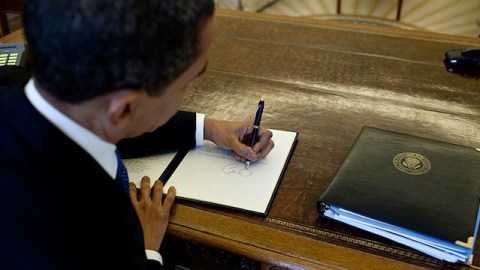The Budget Is a Moral Document

“The budget is a profoundly moral document,” former Clinton advisor Paul Begala told Greg Sargent. “For where your treasure is, there will your heart be.”
Budgets, after all, reflect our priorities. That’s why it shouldn’t be surprising that the recent budget negotiations in Congress were not only about how much money would be cut from the budget, but also about which programs would be cut. Republicans wanted to cut eliminate money going to implement the health care reform and finance reform bills, as well as cut funding to Planned Parenthood and the Environmental Protection Agency. Democrats wanted to consider cutting the defense budget as well.
President Obama and Rep. Paul Ryan’s (R-WI) competing long-term budget proposals embody different sets of priorities and represent radically different moral visions. Part of the problem with Ryan’s plan is that it depends upon economic projections from The Heritage Foundation that were so unrealistic and so widely ridiculed that The Heritage Foundation actually removed any record of them from its website. But it also represents a distinct idea about what government should be.
As I wrote last week, Ryan’s plan would reduce spending by drastically cutting programs like Medicaid that are designed to help lower-income Americans. Ryan would return much of the savings achieved from cutting those programs to wealthy Americans in the form of new tax cuts. Compared with our current budget, Ryan’s plan would sharply reduce the amount of money the federal government transfers from the rich to the poor. The moral principle behind Ryan’s budget is that it is better to let people keep themselves. They earned it, after all. Giving it to people who didn’t earn it would unfairly punish them and reward others, lowering our incentive as individuals to do well.
But in my view it is more complicated than this. Asking the wealthy to give away most of their money would indeed be wrong. But it is fair to ask them to share some of what they make to help underwrite the system that made their prosperity possible and to support those who have not benefited from as much from that system. In the speech announcing his plan, President Obama articulated this vision:
We believe that in order to preserve our own freedoms and pursue our own happiness, we can’t just think about ourselves. We have to think about the country that made these liberties possible. We have to think about our fellow citizens with whom we share a community. And we have to think about what’s required to preserve the American Dream for future generations.
Obama has made this case before in explaining the value of regulations. Most of the wealthy may have indeed earned their success with their skills and hard work. But to some extent each of them has also been at the right place at the right time. Each has benefited from a system that has favored their projects, while other hard-working, talented people have not been as lucky. The success of the wealthy—and of our whole community—depends on to some extent of the efforts of everyone in it. Spending some money to ensure that our whole community prospers is both in our collective interest and is also the right thing to do.
Photo credit: Pete Souza





